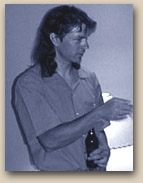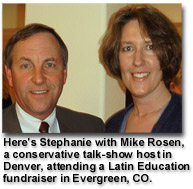- Carolyn Gargaro
- Brenda Fine
- Cliff Pickover
- Eileen Ciesla
- Mike Brown
- WorldNetDaily
- Newsmax
- Washington Times
- Arts and Letters Daily
- American Partisan
- SpinTech
- Enter Stage Right
- The Women's Quarterly
- G. Gordon Liddy Show


Remember Northern Exposure? A fabulous show -- its most compelling aspect to me was that one actress, Jo Anderson, played two very different roles -- one as Roslyn, one of the lesbian co-founders of Cicely, Alaska, and the other as Jane, the school teacher, who rejects Maggie's conception of feminism. I really respected the balance of that -- both characters were written and portrayed with integrity, and the writers understood that such disparate characters both had very valid perspectives.
Most people think I'm a liberal feminist. After all, I listen to "alternative" music (jazz & blues [my favorite], too); I like to do yoga (although I'm quite awful -- to the point of being downright amusing); I'm learning to compost and I grow my own vegetables; I prefer to heal myself with herbs; I'm not anti-gay, and have some fabulous gay friends; I even like going to poetry readings. And before my son was born, I didn't wear a bra! But beyond all these superficial "cues," I've been told I exude a fair amount of self-confidence, and I've been successful at most of my "endeavours." All this, despite the fact that I'm female, so, of course, I must ascribe to feminism, right? Only ardent feminists, networking and celebrating their gender could ever have the kind of self-confidence and success I've experienced.
Well, I'm neither liberal nor a feminist.
During Women's History Month in March 1989, I was editor of the arts & entertainment section of my college newspaper and felt compelled to write a column to acknowledge it. The professor of my 18th Century British Novel class, who also taught women's studies, gave me some initial information and I began to research what I thought were important historical feminist contributions. But what I found, in addition to some valuable victories (yes, like the vote) were some strange philosophies regarding what contributes to a person's success and self-esteem. Many early and most later feminists believed they were women first, individuals second (if at all). Beyond that, they believed that females shared some sort of inherent bond with one another, and that it was important to remain loyal to other women, regardless of the differences between individuals. Once I actually read what the feminist theorists past and present were really saying, I realized I wasn't one of them.
Neither was my mother. She didn't need feminism to help her reach her goals; what's more, she didn't want to give feminism credit for her personal, individual triumphs. Like me, she was appreciative of women who fought for the vote, but not appreciative of women who fought for a long and convoluted liberal agenda, claiming it was on my mother's behalf. I never heard the word "feminism" in our house, but I saw my mother set aside her college degree for several years so she could stay home with me; I saw my mother re-enter the work force to teach high school -- and become one of the few "loved" and respected teachers in an environment most teachers dread; I saw my mother get up at 4:00 in the morning to make sure the laundry was done; I saw my mother adapt from teaching to selling real estate to working as a legal secretary; I saw my mother learn to use a computer at the age of 50; I saw my mother rise to the position of president of our local Business & Professional Woman's organization; and I saw my mother bake plenty of cookies. She didn't want the government's help raising me. She didn't need consciousness raising groups to tell her she was a victim of patriarchal society. She didn't need to outlaw pornography to retain her own personal respect as a woman. Respect for my mother was and is earned by my mother, and she alone. Feminists like to describe women such as my mother as representatives of "tokenism." Even more of a reason to question their ideology.
At the end of my favorite movie, "Being There," a mentally deficient
Chance, or Chauncey Gardiner, wanders away from the funeral of a friend,
and in a Jesus metaphor, walks out across the top of a lake to study a
wilted sapling growing several yards out in the water. He's able to walk
on water because he doesn't realize that he can't. What a much better
outlook on life than always complaining how this group or that one is
keeping us down, how we have no control over our own direction. "Life,"
says the eulogist at the funeral as Chance, oblivious, studies the
leaves, "is a state of mind."
The basics about me:
- Age: Early 30s
- Height: Six feet
- Favorite Musicians: Philosopher Kings, Seal
- Favorite Funny People: Rowan Atkinson/Steve Martin
- Favorite Novel: Henderson the Rain King by Saul Bellow
- Favorite Movies: Being There, 2001, The Full Monty, Groundhog Day
